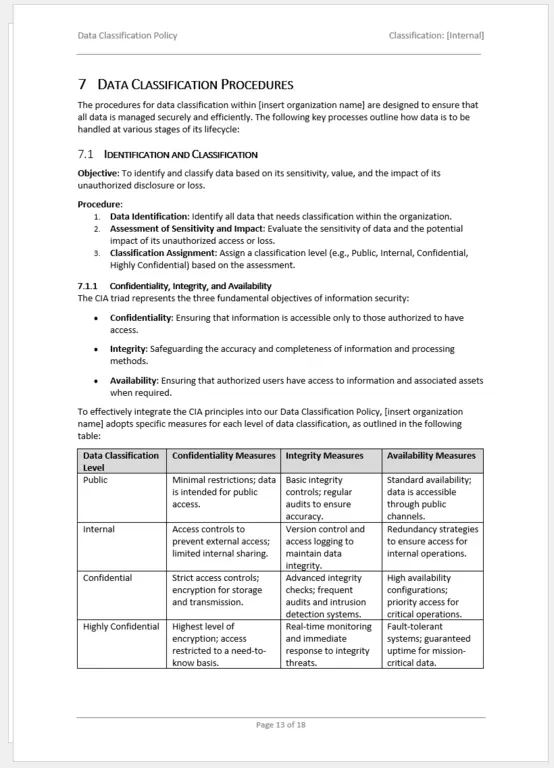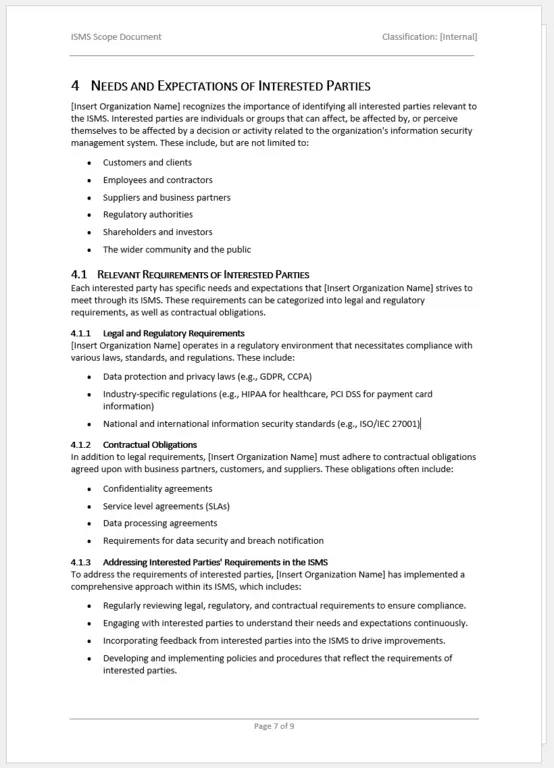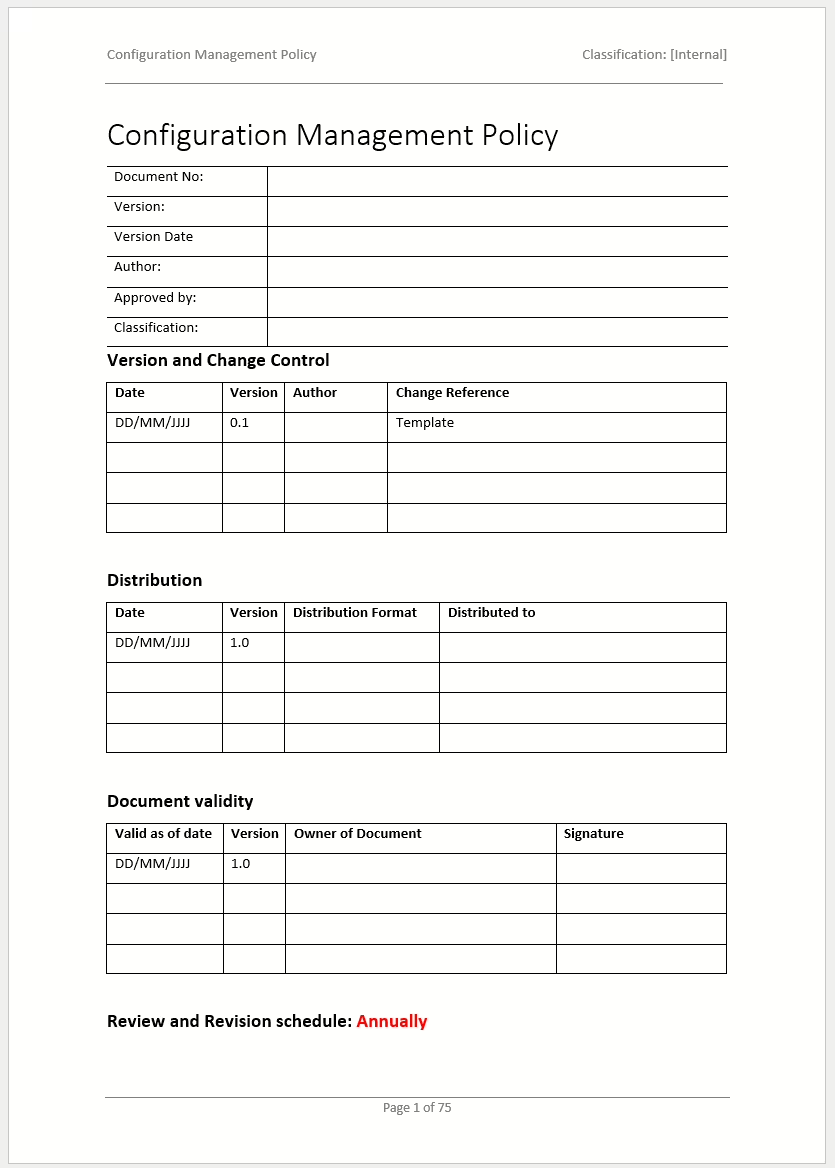Social Media Policy Template: A Must-Have Cybersecurity Policy
While social media empowers organizations to engage with audiences instantly, it also poses risks—one unguarded post can unleash security breaches or compliance complications.
Employee social media behavior can have serious consequences for a company’s reputation and legal liability.
Yet nearly 45% of companies don’t have a social media policy in place, leaving many businesses exposed to avoidable risks.
Experts warn that no matter the size of your business – from one employee to thousands – a policy is essential to govern social media use, even for remote or off-hours activity.
Our Social Media Policy Template is designed to fill this critical gap.
It provides a professional yet accessible solution that helps mitigate cybersecurity risks, protect sensitive data, and ensure regulatory compliance.
This template offers organizations an easy way to implement a strong social media governance framework as part of onboarding, employee handbooks, and broader compliance programs – all in a fully editable Word format for seamless integration.
Cybersecurity Imperative: Mitigating Risk, Protecting Data & Ensuring Compliance
A strong social media policy establishes clear rules and “regulations that control how social media is used across your company,” helping staff understand limitations, standards, and best practices when representing your brand online.
With setting these guardrails, the policy proactively reduces the likelihood of security incidents – for example, by prohibiting sharing of confidential information or clicking suspicious links that could lead to breaches.
In effect, the template functions as a safety net that catches risky behavior before it causes harm.
Data protection is at the heart of this policy. Guidelines emphasize confidentiality and privacy, making it explicit that sharing customer data or disclosing confidential information is not permitted under any circumstances.
This helps prevent leaks of sensitive data and intellectual property on social channels.
The policy also addresses modern threats like social engineering and phishing via social media, with instructions for secure practices (such as using strong passwords and two-factor authentication on corporate accounts).
Equally important is regulatory compliance. From data privacy laws (GDPR, CCPA) to industry-specific regulations (like FINRA in finance or HIPAA in healthcare), organizations face strict rules governing online communications.
This template is built to ensure your social media activities adhere to applicable laws and regulations. It incorporates guidance aligned with global data protection laws, intellectual property rights, advertising standards, and disclosure requirements.
With following the policy, employees help the organization stay on the right side of the law, avoiding fines and legal pitfalls.
Even regulators have emphasized that companies must properly manage compliance, operational, and reputational risks arising from social media use– this template provides the structure to do exactly that.
Implementation in Onboarding and Compliance Programs
Integrating the Social Media Policy Template into your organization is straightforward.
The policy can be introduced during new employee onboarding, ensuring that staff are aware of social media dos and don’ts from day one.
By including it as part of your onboarding checklist, you set clear expectations early and foster a culture of safe online behavior.
The template is also designed to be (partly) inserted into employee handbooks or codes of conduct, alongside other key policies.
Making it part of the employee handbook means every team member has a reference to official social media guidelines at their fingertips – and acknowledges these rules as a condition of employment.
Beyond individual awareness, the policy supports your broader compliance and security programs.
It complements existing IT security policies, data protection policies, and HR guidelines, creating a unified governance framework. HR and compliance teams can easily incorporate this policy into training sessions and annual compliance refreshers.
Because it aligns with the company’s other workplace policies, it ensures consistency in tone and enforcement across the board.
Auditors and regulators will recognize that your organization has taken concrete steps to manage social media risk as part of its internal controls and compliance efforts.
In short, implementation is not an afterthought – it’s embedded into your organizational processes, from hiring to ongoing governance.
Professional and Accessible Policy Design
The content is crafted by our cybersecurity and legal experts to cover all necessary governance points, but it’s written in clear, plain language that anyone in the company can understand.
This balance means the policy reads like a formal corporate guideline (suitable for a boardroom or audit review) while remaining user-friendly for employees.
Jargon and overly technical terms are avoided or explained, so that non-technical staff won’t be overwhelmed.
The template also uses an intuitive structure with logical sections and headings, making it easy for readers to find what they need – be it rules about personal social media use at work or steps for securing an official account.
Throughout the document, the tone is practical and instructive rather than punitive.
For example, instead of simply listing prohibitions, it often provides rationale or examples to educate employees on why certain rules matter (such as protecting client data or the company’s reputation).
This approach encourages buy-in and compliance: employees see the policy as a helpful guide rather than just restrictions. The result is a policy that upholds strong governance standards while being usable in daily practice.
Key Features of the Social Media Policy Template
This comprehensive template covers all the critical aspects of social media governance for an organization. Key features include:
Legal and Regulatory Compliance
Detailed provisions ensure that employee social media use complies with the law.
The policy addresses data protection, privacy, intellectual property, advertising, and defamation requirements, among others.
It helps companies meet obligations under regulations like data privacy laws and industry-specific mandates.
With clearly outlining these rules, the policy protects the company from legal violations and reinforces ethical conduct online.
Brand Protection and Reputation Management
The template provides guidelines to safeguard your brand’s integrity across social platforms.
Employees are instructed on proper use of company logos, trademarks, and messaging to prevent brand dilution or misrepresentation.
As an example, it advises employees how to represent themselves and the company professionally on social media as part of the company’s code of conduct.
Rules around posting sensitive company news, handling negative comments, and avoiding offensive or disparaging content help maintain a positive brand image.
The policy turns your workforce into responsible brand ambassadors while setting clear boundaries to avert PR crises.
Employee Conduct and Guidance
At its core, the policy is a set of practical guidelines for employee behavior on social media, both on and off the job. It defines what is considered acceptable and unacceptable when employees discuss work-related matters online.
Topics covered include professionalism (e.g. no harassment or hate speech), respecting confidentiality, and differentiating personal opinions from official company positions.
These guidelines remove ambiguity and provides your team tools about what is appropriate online.
With clear examples of do’s and don’ts, employees are empowered to engage on social platforms without putting the company at risk.
This section essentially answers the question for staff: “What should I do – and not do – on social media when it relates to my work?”
Security Protocols for Data Protection
Unique among many social media policies, this template has a strong cybersecurity focus.
It includes protocols to mitigate security breaches and data leaks via social media.
Guidelines reinforce the handling of sensitive information: for instance, employees are reminded that confidential business information and customer data must never be posted publicly.
The policy covers secure account management practices (such as using approved devices and secure passwords for company social accounts) and cautions against social engineering tricks.
Through educating employees on how to recognize and avoid phishing attempts or malicious links encountered on social media, it mitigates a common attack vector.
These security measures protect both the organization’s information and its people from cyber threats originating on social platforms.
Enforcement and Accountability
To be effective, a policy must be enforceable. This template outlines clear enforcement measures and escalation paths.
It specifies how compliance will be monitored and the consequences of violations.
Employees may be required to acknowledge the policy (e.g. sign an agreement) to ensure awareness.
The document also states the penalties for infractions, which can range from warnings up to termination, depending on severity.
Clearly communicating that there are consequences for non-compliance, the policy deters risky behavior – employees who know the rules and the repercussions are far less likely to make hasty decisions that could harm the company.
Additionally, the policy includes instructions for reporting suspected breaches or issues, creating a culture of accountability and proactive risk management.
Editable Word Format and Easy Integration
Every organization has unique needs, and this Social Media Policy Template is built to be fully customizable to match yours.
It comes in Microsoft Word format, so you can easily edit, extend, or reorganize any section.
The template includes convenient placeholders for key details – such as [Company Name], [Policy Owner], [Dates], and specific role titles – which you can quickly replace with your company’s information.
This saves time and ensures the policy feels specified to your organization from the start.
The content is modular, allowing you to adapt it to your industry and internal culture.
You can add industry-specific guidelines wherever appropriate.
For instance, a financial services firm can insert references to SEC or FINRA social media rules, a healthcare company can incorporate HIPAA privacy reminders, and so on.
Similarly, if a section isn’t relevant to your business (for example, if your company has no official social media accounts, you might not need the section on corporate account usage), it can be removed or adjusted with ease.
The template is structured to maintain coherence even if you modify its components – each section is self-contained and contributes to the overall policy.
Because it’s provided in Word format, integration into your existing documentation is seamless.
You can merge this policy into your current employee handbook, combine it with other security policies, or simply add your branding (logo, company fonts) to match your standard policy documents.
The formatting is clean and professional, ready for you to print or convert to PDF for distribution.
Track changes and collaboration features in Word also make it simple for your legal, HR, or security teams to review and approve the policy.
The template is not a one-size-fits-all static file – it’s a flexible foundation that you shape into a policy perfectly suited for your enterprise.
Mature Your Security Posture and Compliance
a well-crafted social media policy is a much needed document for any security-conscious organization.
It significantly reduces risks like reputational damage or legal liability by providing clear guidance for responsible, ethical social media use.
Adopting this Social Media Policy Template, you equip your organization with a complete, customizable policy developed with cybersecurity best practices and regulatory compliance in mind.
This template helps protect your data & brand and also saves you countless hours of drafting.
With this professional yet easy-to-use template, you can implement social media governance quickly and confidently.











